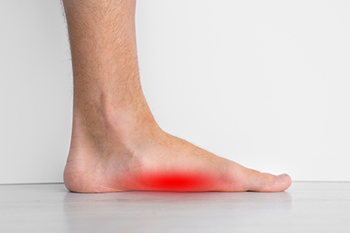
The condition that is known as pes planus, or flat feet, is common among babies. It is an ailment that most people are born with, and the arch generally develops during the teenage years. This condition can correct itself, as the muscles and soft tissues become stronger. A child’s foot is often examined by a podiatrist, who may be able to determine if there is an underlying cause. Some of these can include cerebral palsy, connective tissue disorders, or juvenile arthritis. There may be an abnormal foot structure that can cause flat feet, in addition to possible muscle or ligament damage. Additionally, adults who are overweight may have flat feet, as a result of the extra pressure the feet endure from completing daily activities. Many people who have this condition find it beneficial to perform specific stretches that may gradually improve flexibility and range of motion. If you or your child have flat feet, please consult with a podiatrist who can address any concerns and answer questions you may have.
Flatfoot is a condition many people suffer from. If you have flat feet, contact one of our podiatrists from Personal Podiatry Associates. Our doctors will treat your foot and ankle needs.
What Are Flat Feet?
Flatfoot is a condition in which the arch of the foot is depressed and the sole of the foot is almost completely in contact with the ground. About 20-30% of the population generally has flat feet because their arches never formed during growth.
Conditions & Problems:
Having flat feet makes it difficult to run or walk because of the stress placed on the ankles.
Alignment – The general alignment of your legs can be disrupted, because the ankles move inward which can cause major discomfort.
Knees – If you have complications with your knees, flat feet can be a contributor to arthritis in that area.
Symptoms
- Pain around the heel or arch area
- Trouble standing on the tip toe
- Swelling around the inside of the ankle
- Flat look to one or both feet
- Having your shoes feel uneven when worn
Treatment
If you are experiencing pain and stress on the foot you may weaken the posterior tibial tendon, which runs around the inside of the ankle.
If you have any questions please feel free to contact our offices located in Tamarac and Pembroke Pines, FL . We offer the newest diagnostic and treatment technologies for all your foot and ankle needs.
